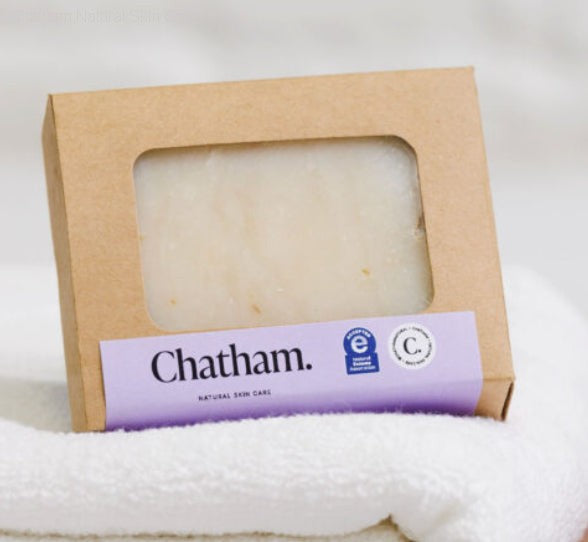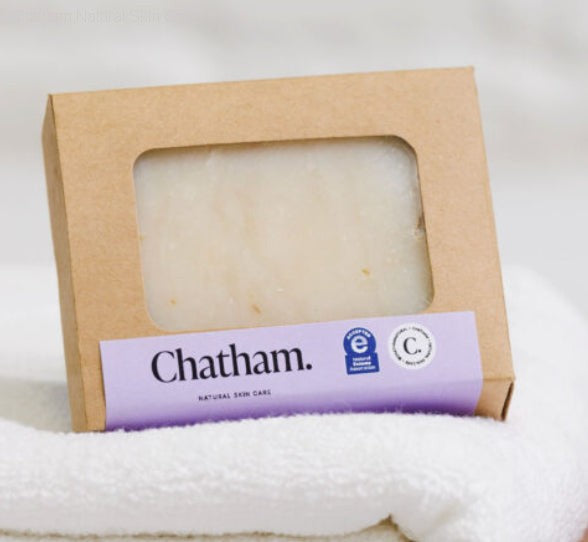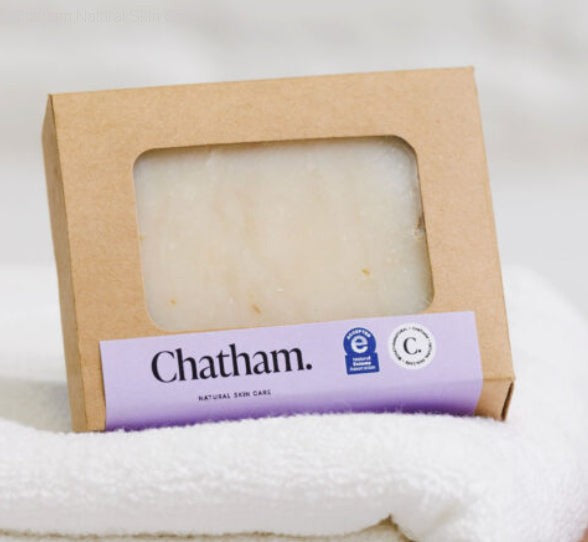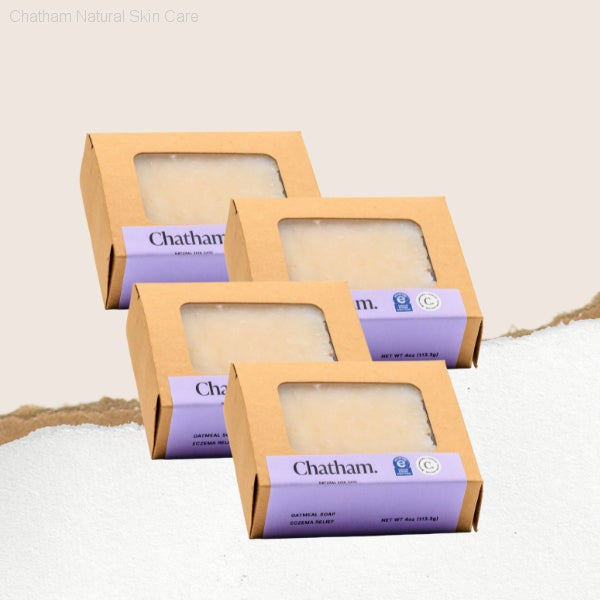4 products
-
Eczema Relief Oatmeal Soap Single Bar
 Vendor:Eczema Relief Oatmeal Soap Single BarChatham Natural Skin Care
Vendor:Eczema Relief Oatmeal Soap Single BarChatham Natural Skin Care- Regular price
-
$9.99 - Regular price
-
$0.00 - Sale price
-
$9.99
Quick view
-
Oatmeal Natural Soap
 Vendor:Oatmeal Natural SoapChatham Natural Skin Care
Vendor:Oatmeal Natural SoapChatham Natural Skin Care- Regular price
-
$9.99 - Regular price
-
$0.00 - Sale price
-
$9.99
Quick view
-
Oatmeal Natural 4 Soap Bars
 Vendor:Oatmeal Natural 4 Soap BarsChatham Natural Skin Care
Vendor:Oatmeal Natural 4 Soap BarsChatham Natural Skin Care- Regular price
-
$32.99 - Regular price
-
$0.00 - Sale price
-
$32.99
Quick view
-
Oatmeal Soap 4 Bars
 Vendor:Oatmeal Soap 4 BarsChatham Natural Skin Care
Vendor:Oatmeal Soap 4 BarsChatham Natural Skin Care- Regular price
-
$32.99 - Regular price
-
$0.00 - Sale price
-
$32.99
Quick view
Why customers love All Over Butter
If you’re researching shea butter for eczema, here’s the big picture: shea butter is a rich emollient that helps soften rough, flaky patches and supports the skin’s moisture barrier—two everyday goals in eczema care. Dermatology guidance consistently emphasizes moisturizing right after bathing and often favors thicker creams and ointments over thin lotions for longer-lasting comfort.
Smart ways to use shea butter in an eczema routine
- After bathing, “soak and seal.” Bathe, apply any prescribed meds to affected areas, then moisturize the rest while skin is still slightly damp.
- Consider wet-wraps at night during tougher flares (ask your clinician). These can help lock in moisture and support your topical treatments.
- Choose fragrance-free. Fragrance is a common irritant for sensitive, eczema-prone skin.
- Keep routines simple. Short ingredient lists can reduce potential irritants. Moisturize at least daily—and always after bathing.
Safety notes
- Patch test first if your skin is reactive or you have a history of sensitivities.
- Nut allergy? Shea comes from the shea nut. Many people with nut allergies tolerate shea on skin, but everyone’s different. When in doubt, patch test and consult your clinician.
- Kids and babies: Gentle, fragrance-free moisturizers are common in pediatric routines; ask your pediatrician about layering with meds and if/when to use wet-wraps.
Where All Over Butter fits
Use All Over Butter as your daily seal-in step—especially right after bathing—on damp skin from head to toe. During flares, follow your provider’s directions for medicated treatments first, then moisturize. If your skin is highly reactive, start with a small patch test and keep the rest of your routine fragrance-free and simple.
FAQs
Does shea butter actually help eczema?
As an emollient, it can soften rough patches and support the moisture barrier—core goals in eczema care. It’s supportive care, not a cure.
Is it safe for sensitive skin?
Often, yes—especially in fragrance-free formulas. Patch testing is wise to check personal tolerance.
Can kids use it?
Common in pediatric routines; discuss with your pediatrician and ask about wet-wraps for moderate-to-severe flares.
Refined vs. unrefined shea—does it matter?
Both are emollient. Unrefined retains more natural compounds and a nutty scent; refined has less scent. Choose what your skin tolerates best.
Will it clog pores on my face?
Many tolerate it; acne-prone skin may prefer lighter creams. Start small on damp skin and assess.
How often should I apply it?
At least daily and after bathing; re-apply to frequently washed or exposed areas (hands, elbows, legs) as needed.
Can shea butter replace prescription creams?
No! moisturizers support the barrier; medicines target inflammation. Use both as directed by your clinician.
Should I avoid fragrance if I’m using shea butter for eczema?
Yes! fragrance is a common irritant for eczema-prone skin. Choose fragrance-free products.
What about bleach baths—do I still moisturize after?
If your clinician recommends them, you’ll still moisturize right after to re-hydrate and comfort skin.
Is shea butter relevant for skin of color?
Yes1 Thicker moisturizers, including shea-based products, are often used in routines for skin of color; as always, patch test and personalize.
Any other tips?
Use lukewarm, short baths/showers; apply moisturizer immediately after; keep routines simple; and follow your provider’s plan during flares.
Sources (read more)
- National Eczema Association — Moisturizing for Eczema (includes soak and seal basics): https://nationaleczema.org/treatments/moisturizing/
- National Eczema Association — Bathing for Eczema (step-by-step soak and seal; wet-wrap overview): https://nationaleczema.org/treatments/bathing/
- National Eczema Association — Wet Wrap Therapy: https://nationaleczema.org/treatments/wet-wrap-therapy/
- National Eczema Association Factsheet (PDF) — Soak & Seal and Wet Wraps: https://nationaleczema.org/wp-content/uploads/2024/09/NEA_Factsheets_ManagingAD-SoakSeal-WetWraps_D01.pdf
- National Eczema Association — Eczema in Skin of Color: https://nationaleczema.org/blog/eczema-in-skin-of-color/
- National Eczema Association — Seal of Acceptance criteria (why fragrance-free matters): https://nationaleczema.org/eczema-products/seal-of-acceptance-criteria/
- For broader background and evidence summaries, search these reputable organizations by name (no links provided here by request): American Academy of Dermatology (AAD); Mayo Clinic; NIH MedlinePlus; Cleveland Clinic; Cochrane Reviews.





